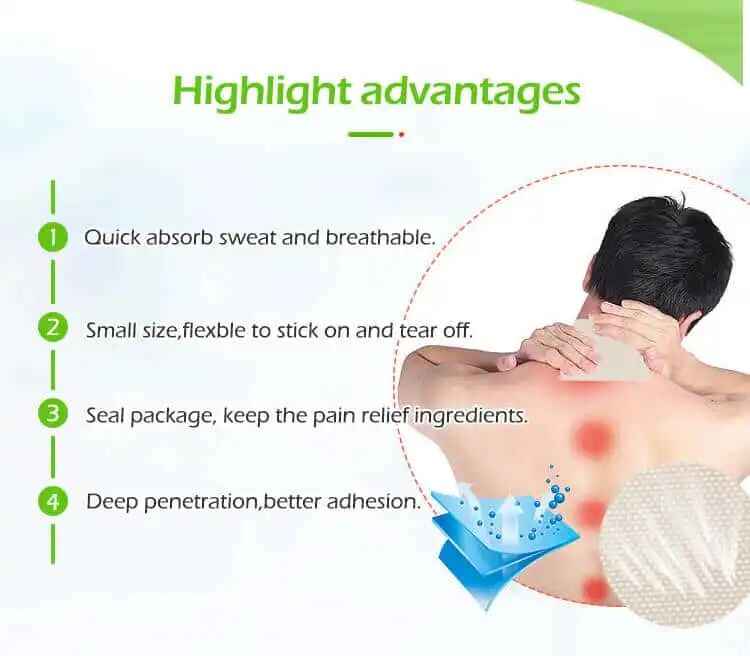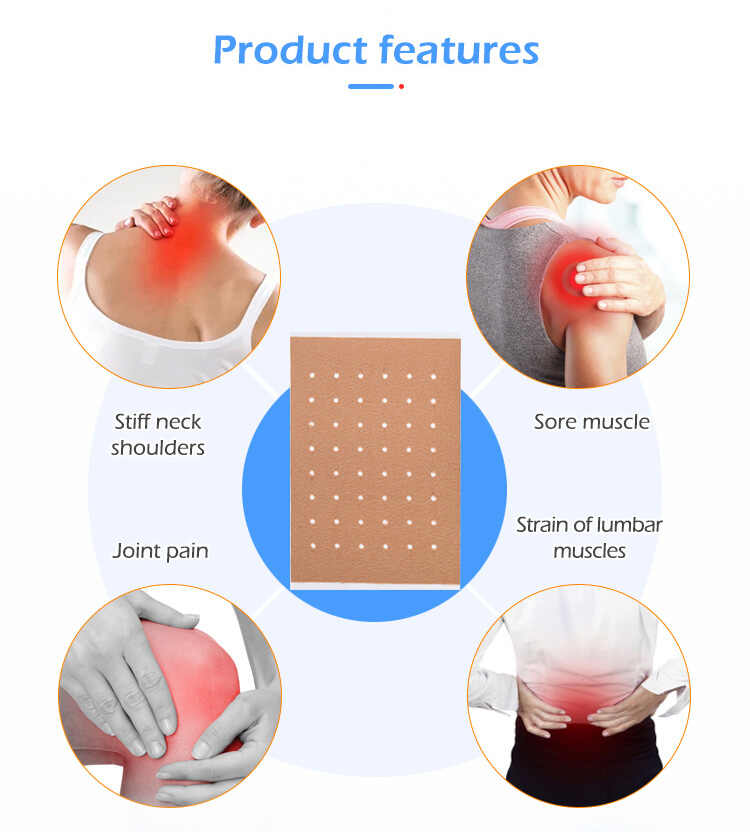What Certifications Should a Sports Pain Patches Manufacturer Have?
In the fast-growing wellness and sports recovery industry, Sports Pain Patches are in high demand. Whether you're launching your own brand or expanding your existing product line, working with a certified and trustworthy Sports Pain Patches Manufacturer is crucial. Certifications aren’t just regulatory checkboxes—they’re proof of quality, safety, compliance, and credibility.

If you're exploring Custom Sports Pain Patches, Private Label Sports Pain Patches, or looking to partner with a Sports Pain Patches OEM, understanding the certifications your supplier should hold is a fundamental step in making a smart, legally-compliant business decision.
Why Are Certifications Important for Sports Pain Patches?
Before diving into the specific certifications, let’s explore why they matter:
1. Consumer Safety
Sports pain patches are applied directly to the skin, and often contain active ingredients like menthol, camphor, or herbal formulations. Certifications ensure these products are manufactured in sterile, safe environments and meet international safety standards.
2. Regulatory Compliance
Different markets (such as the U.S., EU, and Asia) have distinct requirements. Partnering with a certified Sports Pain Patches Manufacturer helps you avoid delays, fines, or product recalls.
3. Brand Reputation and Trust
Customers are more likely to trust your Private Label Sports Pain Patches if they come from a certified facility. It shows your commitment to safety, quality, and transparency.
4. Market Accessibility
To legally sell products in many regions, you must ensure they meet specific regulatory and quality standards. The right certifications open doors to global distribution.
Key Certifications a Sports Pain Patches Manufacturer Should Have
Here are the most essential certifications your Sports Pain Patches OEM or Supplier should possess:
1. GMP (Good Manufacturing Practice)
What is it?
GMP is a set of regulations that ensure products are consistently produced and controlled according to quality standards.
Why It Matters
Ensures hygiene and safety throughout the production process
Required by regulatory agencies worldwide
Signals a high level of quality control
Look For:
WHO-GMP (World Health Organization)
US FDA GMP
EU cGMP (Current GMP)
2. ISO 13485 – Medical Device Quality Management System
What is it?
ISO 13485 is an international standard that outlines the quality management system requirements for medical device manufacturers—including topical patches.
Why It Matters
Ensures traceability and documentation for every production batch
Required for many pain relief products, especially in clinical or retail medical use
Often mandatory for entering markets like the EU, Canada, and Australia
3. FDA Registration (For U.S. Market)
What is it?
The U.S. Food and Drug Administration (FDA) requires that facilities producing drug products (including some topical patches) register annually.
Why It Matters
Essential for distributing products in the United States
Indicates compliance with U.S. safety, labeling, and ingredient standards
Bonus:
Check if the Sports Pain Patches Manufacturer also has experience in filing OTC Drug Monograph documentation if the product falls under it.
4. CE Marking (For EU Market)
What is it?
CE Marking certifies that a product meets EU safety, health, and environmental protection standards.
Why It Matters
Required for selling patches in the European Union
Applies to patches classified as medical devices
Boosts brand image and shows adherence to strict European standards
5. ISO 9001 – General Quality Management System
What is it?
ISO 9001 is a globally recognized standard for quality management systems, not specific to medical products but highly relevant.
Why It Matters
Demonstrates the manufacturer’s commitment to consistent quality
Adds credibility even if other certifications are in place
Covers areas like process control, customer satisfaction, and risk management
6. MSDS (Material Safety Data Sheet)
What is it?
An MSDS provides detailed information about the chemical properties of each ingredient used in your Custom Sports Pain Patches.
Why It Matters
Essential for transportation, especially internationally
Demonstrates transparency about product safety and composition
Needed for customs clearance in many countries
7. Third-Party Lab Testing
While not a formal certification, it’s important that your Sports Pain Patches OEM is open to third-party testing for:
Active ingredient verification
Skin irritation tests
Microbial contamination tests
Heavy metal and toxin screening
Optional (But Valuable) Certifications
Depending on your market and target audience, you might want to work with a Sports Pain Patches Supplier that also offers the following:
a. Halal / Kosher Certification
Useful for religious compliance in markets like the Middle East and Israel.
b. Cruelty-Free / Vegan Certifications
Especially appealing for wellness brands targeting ethical consumers.
c. Eco-Cert or FSC Packaging Certification
Highlights commitment to sustainability, which is increasingly important for fitness and health-conscious buyers.
How to Verify a Sports Pain Patches Manufacturer's Certifications
Here’s how you can validate the certifications your Sports Pain Patches Manufacturer claims to have:
Request Official Documentation
Always ask for up-to-date copies of certifications and audit reports.Check Registration Numbers Online
Verify FDA or ISO certifications through the official websites or public databases.Visit the Facility (or Request a Virtual Tour)
Seeing the production environment firsthand helps build trust and confirm compliance.Speak with Their Regulatory Affairs Team
A qualified Sports Pain Patches OEM should have in-house regulatory experts who can answer specific compliance questions.
Why Choose a Certified Sports Pain Patches Supplier?
A certified Sports Pain Patches Supplier brings several advantages:
Fewer product returns due to consistent quality
Higher customer satisfaction from safer, more effective products
Faster market entry with pre-approved compliance documents
Greater brand trust among consumers and retailers
Stronger partnerships with distributors and resellers
Red Flags: What to Avoid
Avoid suppliers who:
Refuse to provide certification documents
Do not update their certifications regularly
Have no experience with your target region's regulations
Lack traceability and quality documentation
Outsource production without transparency
These are all warning signs that the Sports Pain Patches Manufacturer may not be up to standard.
Final Thoughts
Choosing a certified Sports Pain Patches Manufacturer is one of the most critical decisions you can make when launching or expanding your wellness brand. Whether you're pursuing Custom Sports Pain Patches, Private Label Sports Pain Patches, or a full-scale OEM partnership, certifications provide assurance of quality, safety, and market readiness.
Don’t settle for unverified suppliers. Ensure your Sports Pain Patches Supplier meets international standards such as GMP, ISO 13485, FDA, and CE. These certifications not only protect your business—they empower your brand to thrive in a competitive and highly regulated global market.
Related Questions and Answers
1. What’s the most important certification for a Sports Pain Patches Manufacturer?
GMP (Good Manufacturing Practice) is the most essential, as it governs quality, cleanliness, and consistency.
2. Is FDA approval required for sports pain patches?
Not always. FDA registration is required for the facility, and some patches must comply with OTC monograph standards.
3. Can I sell pain patches in Europe without CE marking?
No. For patches classified as medical devices, CE certification is mandatory in the EU.
4. Do Private Label Sports Pain Patches need their own certifications?
No, but your manufacturer must be certified. Always list their credentials when marketing your private label products.
5. What if my Sports Pain Patches contain CBD?
Check for local regulations. CBD requires additional certifications and is banned or restricted in some countries.






